- 相關推薦
中國春節手抄報英語版
中國春節作為我國最隆重的節日之一,每年都是熱熱鬧鬧的,那么,下面是小編給大家整理收集的中國春節手抄報英語版,供大家閱讀參考。
中國春節手抄報英語版
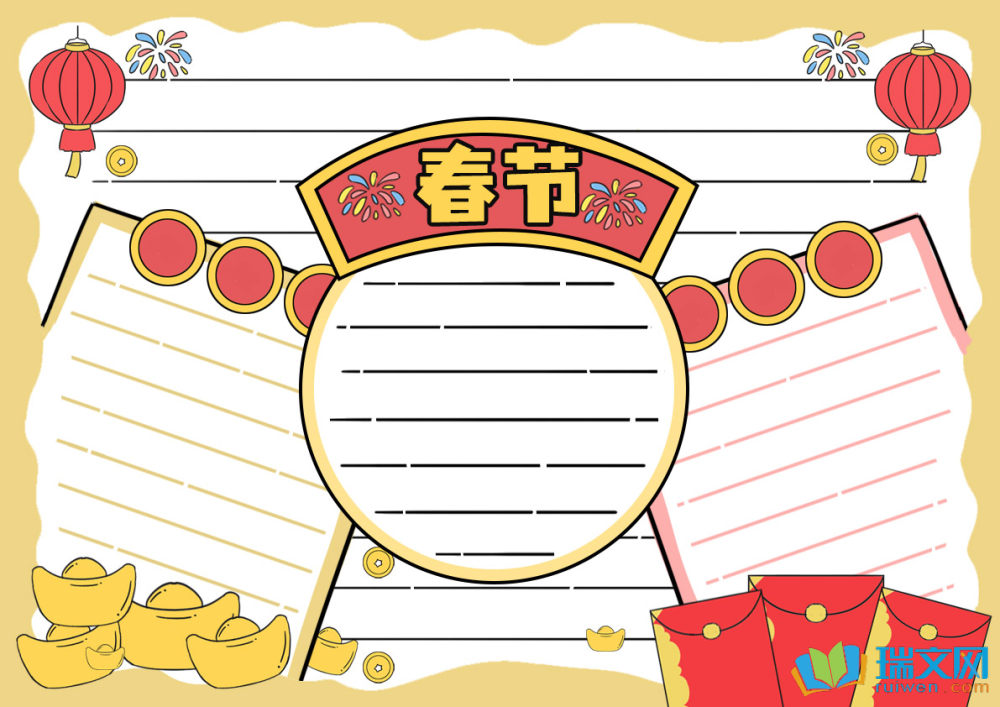
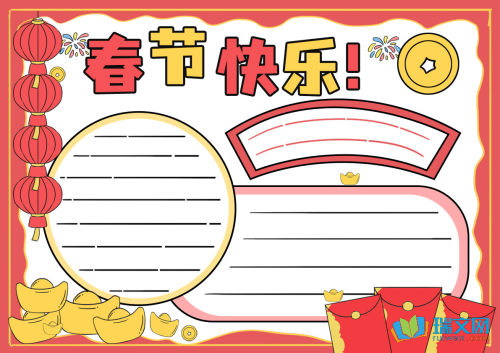
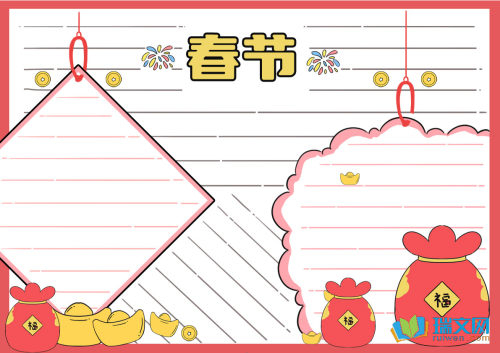
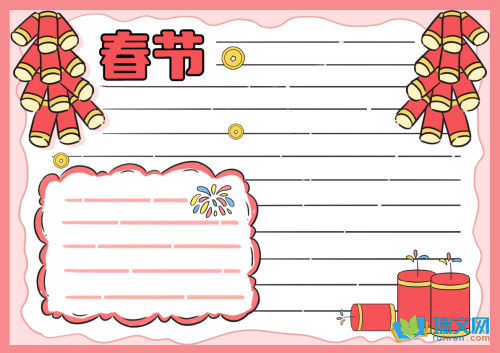
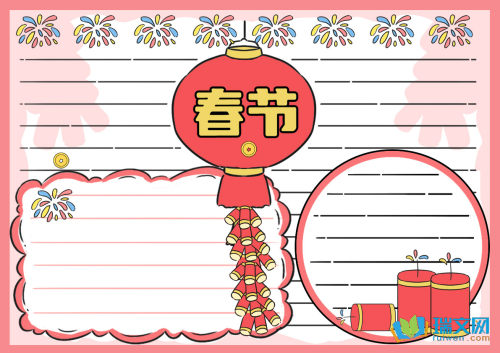
介紹春節的`英語文章1
Chinese New Year or Spring Festival is the most important of the traditional Chinese holidays. It is sometimes called the "Lunar New Year" by English speakers. The festival traditionally begins on the first day of the first month (Chinese: 正月; pinyin: zhēng yuè) in the Chinese calendar and ends on the 15th; this day is called Lantern Festival. Chinese New Year's Eve is known as chú xī. It literally means "Year-pass Eve".
Chinese New Year is the longest and most important festivity in the Lunar Calendar. The origin of Chinese New Year is itself centuries old and gains significance because of several myths and traditions. Ancient Chinese New Year is a reflection on how the people behaved and what they believed in the most.
Celebrated in areas with large populations of ethnic Chinese, Chinese New Year is considered a major holiday for the Chinese and has had influence on the new year celebrations of its geographic neighbors, as well as cultures with whom the Chinese have had extensive interaction. These include Koreans (Seollal), Tibetans and Bhutanese (Losar), Mongolians (Tsagaan Sar), Vietnamese (T65t), and formerly the Japanese before 1873 (Oshogatsu). Outside of Mainland China, Hong Kong, Macau, and Taiwan, Chinese New Year is also celebrated in countries with significant Han Chinese populations, such as Singapore, Indonesia, Laos, Malaysia, the Philippines, and Thailand. In countries such as Australia, Canada and the United States, although Chinese New Year is not an official holiday, many ethnic Chinese hold large celebrations and Australia Post, Canada Post, and the US Postal Service issues New Year's themed stamps.
Within China, regional customs and traditions concerning the celebration of the Chinese new year vary widely. People will pour out their money to buy presents, decoration, material, food, and clothing. It is also the tradition that every family thoroughly cleans the house to sweep away any ill-fortune in hopes to make way for good incoming luck. Windows and doors will be decorated with red colour paper-cuts and couplets with popular themes of “happiness”, “wealth”, and “longevity”. On the Eve of Chinese New Year, supper is a feast with families. Food will include such items as pigs, ducks, chicken and sweet delicacies. The family will end the night with firecrackers. Early the next morning, children will greet their parents by wishing them a healthy and happy new year, and receive money in red paper envelopes. The Spring Festival tradition is a great way to reconcile forgetting all grudges, and sincerely wish peace and happiness for everyone.
Although the Chinese calendar traditionally does not use continuously numbered years, outside China its years are often numbered from the reign of Huangdi. But at least three different years numbered 1 are now used by various scholars, making the year 2009 "Chinese Year" 4707, 4706, or 4646.
介紹春節的英語文章2
The Spring Festival has a great history. In our past, people lived in an agricultural society and worked all year long. They only took a break after the harvest and before the planting of seeds. This happens to coincide with the beginning of the lunar New Year.
The Spring Festival is very similar to the Western one, rich in traditions, folklores and rituals. It has been said that it is a combination of the Western Thanksgiving, Christmas and New Year. This is hardly an exaggeration!
The origin of the Chinese New Year itself is centuries old - in fact, too old to actually be traced. It is popularly recognized as the Spring Festival and celebrations last 15 days.
Preparations tend to begin a month before the date of the Chinese New Year (similar to a Western Christmas). During this time people start buying presents, decoration materials, food and clothing. A huge clean-up gets underway days before the New Year, when Chinese houses are cleaned from top to bottom. This ritual is supposed to sweep away all traces of bad luck. Doors and windowpanes are often given a new coat of paint, usually red, then decorated with paper cuts and couplets with themes such as happiness, wealth and longevity printed on them.
The end of the New Year is marked by the Festival of Lanterns, which is a celebration with singing, dancing and lantern shows.
At the Festival, all traditions are honored. The predominant colors are red and gold. "Good Wish" banners are hung from the ceilings and walls. The "God of Fortune" is there to give Hong Baos. Lion dancers perform on stage continuously. Visitors take home plants and flowers symbolizing good luck. An array of New Years specialty food is available in the Food Market. Visitors purchase new clothing, shoes and pottery at the Market Fair. Bargaining for the best deal is commonplace!
介紹春節的英語文章3
The Spring Festival is a great occasion to the Chinese people. It lasts about the first four days of the year, during which people do not work except for the workers on duty. Students do not go to school, and shops are closed.
Several days before the new year, people begin to prepare. Farmers kill pigs, sheep, cocks and hens. City dwellers buy meat fish and vegetables. Houses are cleaned; coupletsare posted on the doors. Colourful lanterns are hung at the gate.
On the eve of the new year, each family has its members gatherd together and eats a family reunion dinner. After the meal they watch TV until the clock strickes twelve. Then every family sets off long strings of small firecrackers and other fire works to welcome the new year. On the first day of the new year, almost everyone is dressed in his or her best. When people meet on the way, they say to each other "Happy New Year". Friends and relatives pay new year calls and gives presents to each other. Children indulge themselves in games.
【中國春節手抄報英語版】相關文章:
英語版春節手抄報09-07
新年手抄報的英語版02-07
中國夢的手抄報06-21
美麗中國我的中國夢手抄報07-13
2025中國春節習俗手抄報內容03-13
中國傳統節日春節手抄報資料03-13
中國夢手抄報素材10-02
中國夢手抄報簡單03-25
中國夢手抄報精選素材10-11
中國夢手抄報畫03-25